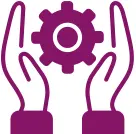Digital Systems for Teaching and Learning
Who is responsible for the systems you use in teaching, and how do we manage them? This page provides an overview of how Digital Learning (DL) at Karolinska Institutet (KI) maintains and develops digital systems such as for example Canvas, Inspera, and Padlet. We work systematically according to the PM3 model, in close collaboration between operations and IT.

Supporting Pedagogy and Learning
The management area "Pedagogical Support" aims to address the educational needs of the organization by providing systems that simplify daily life for educators and students. Currently, there is system support available for digital examinations, digital learning environments, integrated learning, and quality assurance.
The management's goal is to ensure that the systems are:
- Stable – technically reliable and available when you need them.
- User-friendly – support your teaching without creating unnecessary barriers.
- Strategic – contribute to a sustainable and cohesive digital landscape at KI.
Systems we manage within Pedagogical Support (2025)
| System/IT Components | Function | Object products |
|---|---|---|
| Canvas | Learning platform for courses and communication | Digital Learning Environments, Digital Examinations |
| Inspera | Digital examinations | Digital Examinations |
| MyProgress | E-portfolio with external assessment | Digital Examinations |
| TRUE | Digital course certificates and micro-credentials | Digital Examinations |
| InteDashboard | Team-based learning, integrated with Canvas | Digital Learning Environments, Digital Examinations |
| Qpercom | OSCE assessments for practical exams | Digital Examinations |
| Ouriginal | Text comparison and plagiarism detection | Digital Examinations |
| Canvas Studio | Video management within Canvas | Digital Learning Environments |
| Padlet | Digital whiteboard | Digital Learning Environments |
| ReadSpeaker | Text-to-speech and accessibility support | Digital Learning Environments |
| Canvas Catalog | Open courses and course certificates | Digital Learning Environments |
| Smart Designer/Search | Design and search tools in Canvas | Digital Learning Environments |
| ScreenPal | Video management tool | Digital Learning Environments |
| (SUNET Survey) | Online survey tool for course and program evaluations | Owned by Education Administration Management Area |
| (MIRA) | Registration system, CRM | Owned by Education Administration Management Area |
We support a wide range of users at KI, including:
- Teachers
- Education administrators
- Coordinators/administrative officers
- Other teaching staff
For each system, we offer guides, training sessions, workshops, and support.
The model we work with is called PM3, which helps us integrate all the parts into a well-functioning whole. In PM3, systems are classified as IT components, which, together with operational components (manuals, guidelines, etc.), form comprehensive solutions.
Here are two examples of what this can mean in everyday practice:
You are an examiner and want to conduct a digital on-site exam
- You create your exam in Inspera (IT component), using a manual (operational component) for support.
- You run into a problem and contact the ICT educators via support email (operational component).
- You resolve the issue together and continue working on the exam. The exam is later held in a room with prepared computers and student login.
All of this is part of the Digital Examination product – where technology, processes, and support are integrated.
You are a teacher and want to use Padlet as a digital whiteboard in your teaching
- You log in using KI’s license and create a board in Padlet (IT component).
To get started, you use a quick guide and receive support from Digital Learning (operational component). - You share the Padlet as a link in your course room in Canvas.
- Students then use it together with you during a seminar.
All of this is part of the Digital Learning Environments product – where technology and pedagogical support work together.

Current goals for the Digital Systems
To ensure our systems remain relevant, useful, and secure for both staff and students, we continuously work with clear goals in our management processes. This includes both long-term initiatives and short-term improvements. Below are some examples of what we are currently focusing on — all with the aim of continually improving the digital learning environment.
Short-Term Goals (2025)
- Automated user management in Inspera
Less admin, fewer errors – more time for teaching.
We’re streamlining Inspera by automating user management. This means fewer manual steps for you, reduced risk of errors, and more time to focus on the pedagogical aspects of digital examinations. - Launch of Learning Analytics
Better follow-up and development of your teaching.
We’re working to implement tools that help you track both teaching outcomes and student progression – directly within your existing systems. - Introduction of "New Quiz" in Canvas
A more flexible and modern assessment tool.
The new quiz format will make it easier for you to create varied and engaging digital assessments. We’re beginning the work to roll out “New Quiz” in Canvas. - Integration of Padlet
More interactivity and collaboration in your teaching.
Want to use an interactive whiteboard in your lessons? We're integrating Padlet so you can easily engage students and collaborate in real time – directly from Canvas. Our goal is to make Padlet a fully embedded part of the learning environment. - Migration from Kaltura to Canvas Studio
Simplified video management – everything in one place.
We’re moving from Kaltura to Canvas Studio to make it easier for you to upload, manage, and share educational videos – all within the same platform. - Clearer User Terms and conditions
So you know exactly what’s available, what each system is for, and how your data is protected.
We’re working to clarify the terms of use, helping you understand your access, rights, and responsibilities in a simple and transparent way.
Long-term goals (2026–2027)
- Enhanced GDPR and information security
We aim to strengthen data protection and compliance to ensure your and your students’ data is handled securely and in accordance with legal requirements. - Expanded Learning Analytics in Inspera and MyProgress
Our goal with this is to give you – as a teacher, supervisor, or examiner – better insights into student development. Students will also gain better visibility into their own progress and learning journey. - Improved documentation and system classification
For better transparency and more efficient system management.
We’re enhancing our documentation and classification of systems and reviewing user guides to make it easier for you to find what you need, understand what applies, and get started quickly. - Simplified external user management in Canvas Catalogue
To make collaboration with external participants easier.
Improved account management in Canvas Catalogue will help you work more smoothly with users outside KI.
System integrations that work for you
Digital tools need to work together seamlessly. That’s why we’re actively integrating systems to create a smoother experience for you as a user. Examples include:
- IDAC to Canvas – simplified access management
- LADOK to Canvas, Inspera, and MyProgress – better student data flow
- Canvas to InteDashboard – interactive learning directly in your course
Please note:
The Educational Support object includes only IT components, where Teaching and Learning (UoL) is responsible and holds the budget.
PM3 and the Digitalisation Portfolio at KI
The PM3 model is used at KI for system management, helping to establish structure, clear roles, and long-term value in IT-related initiatives. We are part of the Digitalisation Portfolio, a virtual organisation where IT and operations collaborate strategically. This means that our work is structured into objects (e.g., "Educational Support") in which IT and operations work together through clearly defined roles:
Roles in the management organisation:
- Object Owner (Operations): Daniel Rössler Gausel
- Object Owner IT: Fredrik von Feilitzen
- Object Manager (Operations): Mats Brenner, Alex Alexandersson
- Object Manager IT: Sofia André
Contact
If you have questions about the systems, roles and responsibilities, or how we work, please contact the Object Owner (Operations), Daniel Rössler Gausel.
